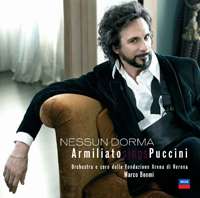|
Back
04/29/2011
Nessun dorma. Armiliato sings Puccini
Giacomo Puccini: Edgar: «Orgia, chimera» – Le Villi: «Ecco la casa... Torna ai felici dì» – Manon Lescaut: «Tra voi, belle, brune e bionde», «Donna non vidi mai», «Senti, di qui partiamo... Ah! Manon, mi tradisce», «Ah! non v’avvicinate... No! no! pazzo son!» – La bohème: «Che gelida manina» – Tosca: «Recondita armonia», «E lucevan le stelle» – Madama Butterfly: «Addio, fiorito asil» – Gianni Schicchi: «Firenze è come un albero fiorito» – Il tabarro: «Hai ben ragione», «Io voglio la tua bocca… Folle di gelosia» – La fanciulla del West: «Or son sei mesi», «Ch’ella mi creda libero» – Turandot: «Non piangere Liù», «Nessun dorma»
Fabio Armiliato (tenor), Orchestra e coro della Fondazione Arena di Verona, Marco Boemi (conductor)
Recorded at the Teatro Filarmonico di Verona (November 6-8, 2008) – 51’71
Decca 4763434 – Booklet in English and Italian

This wonderful recording was made with the support of the Puccini Festival Foundation at Torre del Lago in celebration of the 150th anniversary of the birth of Giacomo Puccini. There could be no better or appropriate artist for this celebration than tenor Fabio Armiliato, who is perhaps the finest “Puccini Tenor” singing on the opera stages today. Mr. Armiliato has sung, with the exception of Roberto in Le Villi and Rinuccio in Gianni Schicchi, all of the major tenor roles in the cannon of Puccini operas. This is not surprising considering his voice is ideal for this repertoire, displaying a technical skill, style, and profound sensitivity that calls to mind many of the great tenors of the past, especially Beniamino Gigli. Like Gigli, Armiliato possesses a clear and ringing sound combined with a sweetness of tone. These qualities, coupled with his extraordinary confidence and charisma on stage, display him with prominence among today’s leading tenors.
Upon first hearing, this recording immediately makes a strong statement by opening with seldom heard arias from Edgar and Le Villi. The brooding and passionate orchestral introduction to the aria from Edgar, “Orgia, chimera”, immediately grabs one emotionally with its melodic pathos. The aria “Torna ai felici di” from Le Villi is equally compelling, and Mr. Armiliato sings them to perfection, which sets the high standard for this recording and the rest of the recital which follows. The ensuing arias on this disc are among the most popular operatic fare ever composed, and they are well known to virtually all aficionados. Everyone has their favorite tenor’s performance of these works, which makes Mr. Armiliato’s efforts doubly difficult. Yet captivate he does with powerful and convincingly individual statements! Credit must also be given to Maestro Marco Boemi, whose suave conducting gives stylish and convincing support to Mr. Armiliato.
What Mimi in La Bohème could resist Armiliato’s tender and seductive charm in “Che gelida manina”, the world’s most famous tenor aria? His brilliant squillo and effortless production of the famous High C will seduce you also. His heart wrenching cries in “No, pazzo son!” are delivered with an abandon that expose the madness and desperation of Des Grieux to the fullest, as he begs to be allowed to accompany his beloved Manon Lescaut to her exile in the fictitious “desserts” of Louisiana. Mario Cavaradossi’s poignant letter to Floria Tosca in “E lucevan le stelle” evokes the atmosphere of the moonlight and the tender remembrances of the brave hero before his impending and violent demise. Seldom have I heard the opening clarinet solo played with as much expression and beautiful tone. Mr. Armiliato’s exquisite use of floated pianissimi and his attention to the text with clear and pointed enunciation recalls the great Giuseppe Di Stefano in this aria. Armiliato is equally memorable, and that is
no small accomplishment.
Of all of the arias in this collection, none is more associated with the late Luciano Pavarotti than the stellar aria from Turandot, “Nessun dorma”. Pavarotti elevated this aria to the status of a “Top 40” pop song, with everyone from Aretha Franklin and Sarah Brightman to Michael Bolton and Andrea Bocelli taking a crack at it. No matter how many encores the great Pavarotti would sing in concert, you knew the show was not over until he sang “Nessun dorma”. This is certainly the touchstone of a tenor’s prowess. Just as the Prince Calaf sings “Vincero!” (I will be victorious) on the final note of “Nessun dorma”, Fabio Armiliato is stunningly victorious in his rendition, which is capped with a brilliant and thrilling High B. Who can resist this quality of singing?
It has often been said that the mark of a truly great singer is one whose voice is immediately recognizable after hearing only two notes of a recording. This can certainly be said of voices like Gigli, Caruso, Callas, or Sutherland. The strikingly individual timbre, bold and sensitive musicality, and charismatic singing of Fabio Armiliato will securely place him in this category to all who come to know his voice.
Nowadays many tenors come and go very quickly on the stage, often because they are made to sing a repertoire which demands too much of their voices too early on in their careers. For example, one needs only to look, unfortunately, at the career of Rolando Villazon, who had to cancel at least three productions last season at the Metropolitan Opera, after appearances in Don Carlo at ROH Covent Garden completely burned him out. Mr. Armiliato, on the other hand, is endowed with a true lirico spinto voice that allows him to take on some of the heaviest repertoire with ease, and a technique that will keep him on the stage for years to come.
This recording is a testament to Fabio Armiliato’s preeminence as a “Tenore Pucciniano”. It is a recording you will want to own, and one which you can set on the shelf with pride next to your recordings of Gigli, Del Monaco, Di Stefano, and Caruso.
Bravo Armiliato!
Micaele Sparacino
|